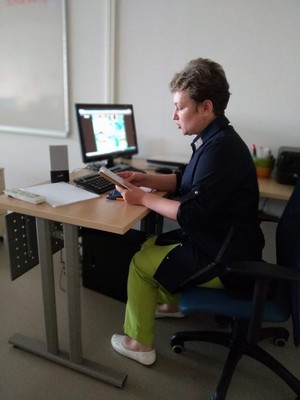
Elena Kolegova
Narva Kreenholmi Gümnaasium, Estonia
Math Without Borders
Thanks for the participation in the project I have more tools to use in the classroom as well as for distant learning process. In this article I would like to share my experience of possibility for teacher to use various tools in math lesson. For this purpose, a fragment of the lesson on the topic "Solving exponential equations by equalizing indicators" the interactive poster Glogster, an online whiteboard Padlet; test created in Quizzizz were used.
Type of lesson: a lesson to discover new knowledge; therefore the motto of the lesson was "the best way to learn something is to discover it yourself".
Competence: Computational thinking
The formation of this competency is facilitated by such objectives of the lesson as:
1. Student is able to hypothesize independatly in order to create an algorithm for solving exponential equations.
2. Student is able to formulate an algorithm for solving exponential equations by the methid of equalixing indicators.
3. Student is able to present the finished product through the interative whiteboard Padlet.
A fragment of this lesson was held with students of grade 10 in Slovenia, on May, 2019. Since the topic "Exponential equations" is studied in Estonia only in the middle of the grade 11, it was decided to use the method of discovering new knowledge to solve the simpliest exponential equations. At the same time, tenth-graders could rely on previously studied material on th etopic "Degree of Poynomials".
At the stage of motivation, so that students internally gather, prepare, and aim at "conquering new hights", the teacher opens the interactive Glogster poster. The epigraph to the lesson is the statement of the great Russian scientist M.V.Lomonosov: "Let one delete the degree in math, and one will see that without it no one will go far".
The updating of reference knowledge (the first block of the interactive Glogster poster) of the topic "Degree of Polynomilas" took place in the form of game-test in Quizzizz using students' mobile phones. A distictive feature of such tests in Quizzizz is that the whole class has he same taks, however, each student recieves on his mobile phone questions in a random sequence/ and works at his own pace. At this stage, students recalled and generalized the properties of degrees.
At the stage of th discovery of new knowledge, students' attention was drawn to the seconf block of the interactive poster Glogster. Understanding what an algorithm and exponential equation are is what allowed us to move on and complete the task. At this stage, students had the idea that the properties of degrees can be applied to the solution of these exponential equations. Sovling the equations and checking them, the students realized that the initial conjecture was correct. Having described the course of their reasoning, they finally got the required algorithm, which they added to the Padlet online board.
For the lesson fragment, the simplest exponential equations where chosen, for instance:
- 3x = 32
- 53x +1 = 52
- 28x – 3 = 4
Feedback from students was quite positive. They liked the use of various digital tools and gadgets at a math lesson. It was suggested that if all the lessons were held in this format, they would know and be able to do much more. At the same time, some students lacked the instructions and explanations from the teacher, as some did not know what the algorithm was and all of them used Quizizz, Padlet and QR Code Reader on their smartphones for the first time.
At the lesson, I really liked the performance of Slovenian students, their bright eyes, surprise, desire to learn, their openness to everything new. The format of the lesson I would have left the same but would have given clearer instructions on how to enter this or that platform. In general, it was a very positive communication experience for both the teacher and students.